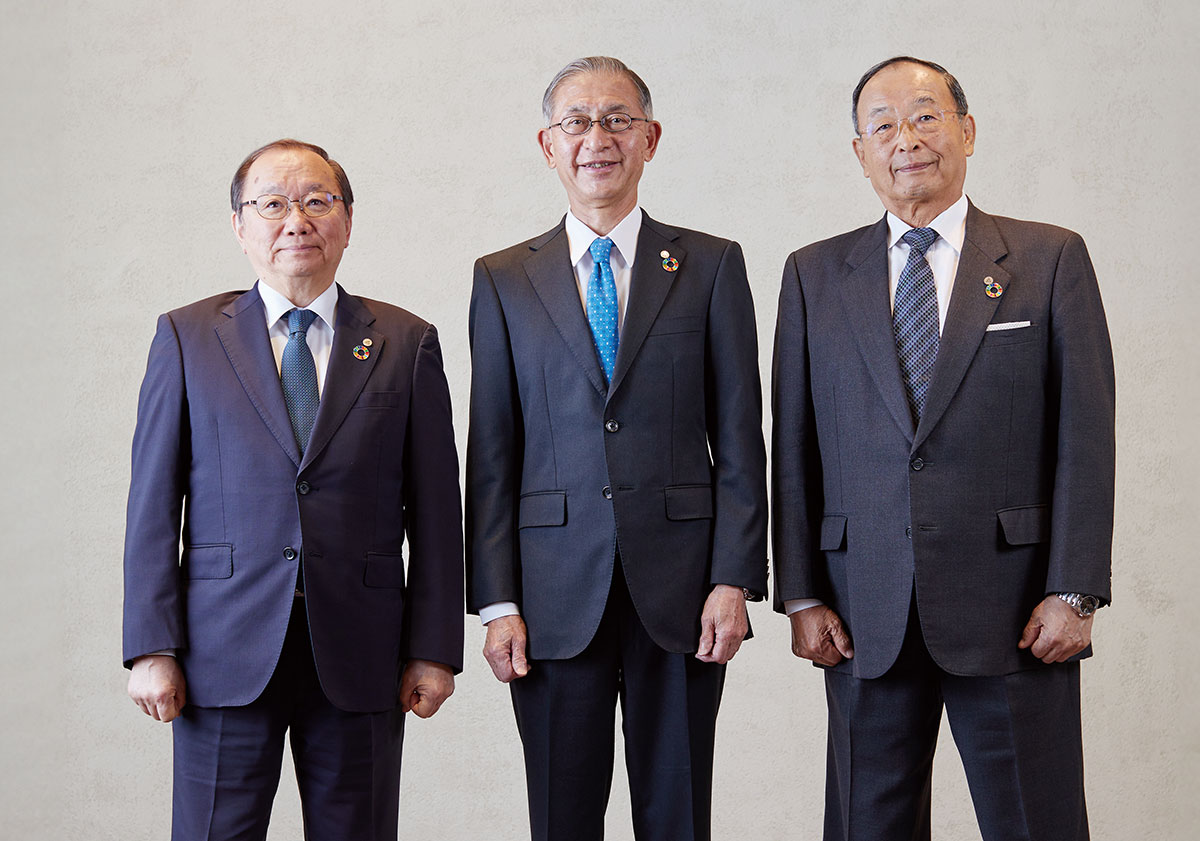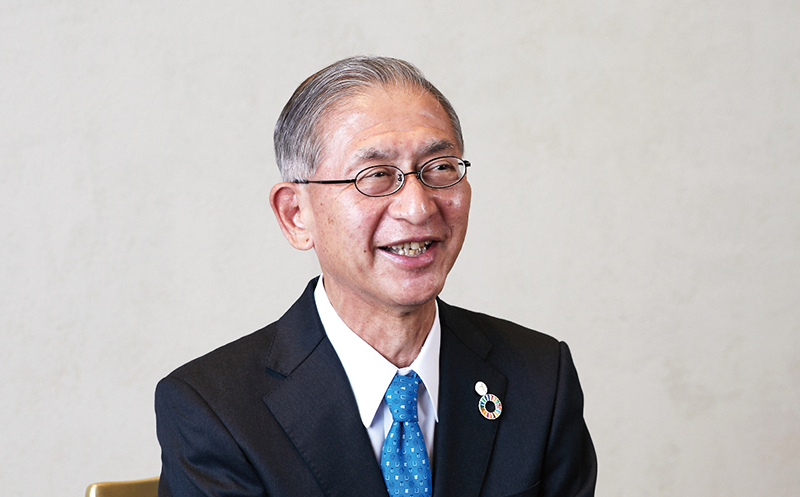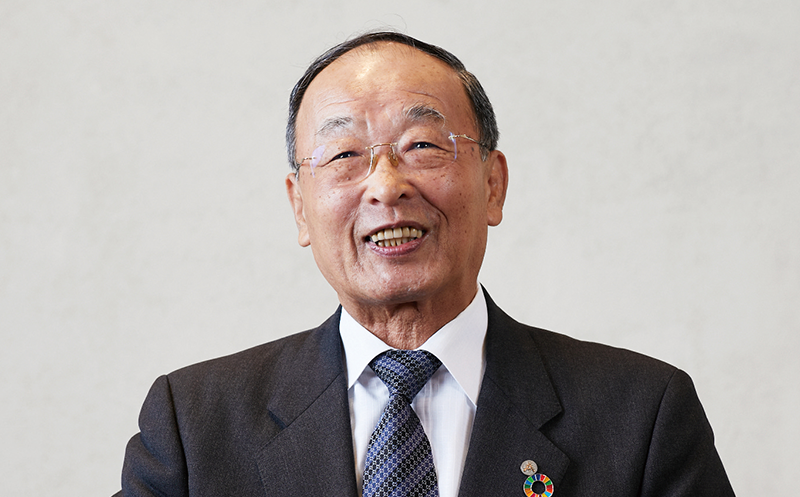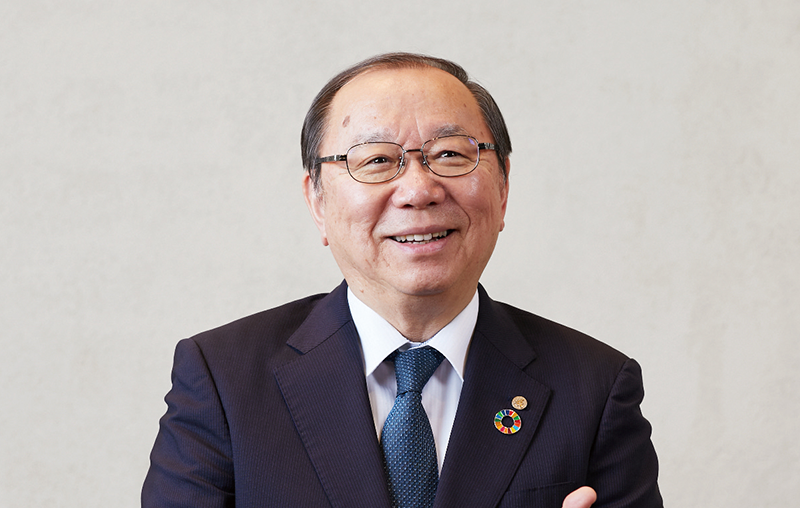
(left)Director and member of the
Audit and Supervisory Committee
TERAMURA Yasuhiko
Had worked in corporate transactions, overseas branches, and fund management during his 29 years in banking. Has practical experience in financial accounting, particularly in the area of fund securities. Was later transferred to an international logistics company, where he worked in management for 13 and a half years. Has also been involved in negotiations in the automobile and machinery industries, and M&A. Was made a standing member of the Artner Audit and Supervisory Committee in 2021. Has served as a member of the committee since 2023.
(center)Director and standing member of the
Audit and Supervisory Committee
NOMURA Ryuichiro
Has worked in corporate transactions, a New York branch, in
foreign exchange, and loans during his 30 years in banking.
As head of the transfer agent department, he was responsible
for investor relations and matters related to stocks and shareholder
meetings.
Later worked for eight years in management at a real estate
company, and as representative of a REIT for a general trading
company.
Was made a member of the Artner Audit and Supervisory
Committee in 2022. Has served as Standing member since 2023.
(right) Director and member of the
Audit and Supervisory Committee
MORII Shinichiro
Oversaw an entire region as the branch manager of a manufacturing company, and was involved in overall marketing/sales, coordinated with the production and development department, and drew up medium-term regional strategies. Was responsible for developing new business and providing sales advice to client companies. Was made a member of the Artner Audit and Supervisory Committee in 2021.
Nomura: |
There used to be two different types of board meetings: “business report board meetings” for detailed reports of business performance, and “regular board meetings” where we discussed medium- to long-term management strategies. The board provided oversight and functioned as the executive. The introduction of the executive officer system in May 2025 clearly separated the executive and supervisory roles, which has allowed the Board of Directors to focus on oversight and on deciding management policies. We believe that this will allow for more rapid management decisions and will improve decision-making efficiency. |
Teramura: |
We receive materials in advance when making decisions about important matters, and when necessary, the relevant departments provide explanations that give us a deeper understanding when we deliberate the issues at hand. Also, the Outside Directors meet regularly with the President to actively exchange opinions, which are reflected in board meetings, and I think this increases the effectiveness of our oversight. |
Morii: |
Board of Directors meetings are held twice a month and extraordinary board meetings once per quarter, which brings everyone onto the same page in regard to business performance, governance, and the direction the Company is taking. |
Nomura: |
The implementation of a succession plan was identified as an issue. I believe that the introduction of the Executive Officer system will significantly contribute to resolving this issue. Reports on investigations by the Nomination and Remuneration Committee will continue to be delivered to the Board in a timely manner. |
Teramura: |
Other issues identified in the effectiveness evaluation included bringing greater diversity into the Board and revitalizing the strategic discussions that lay out the vision for the Company’s future. I believe that the introduction of the Executive Officer system will expand our potential talent pool and will help us achieve greater diversity, including in terms of age and gender. In addition, as we see more of the authority for routine operations delegated elsewhere, I think the Board of Directors will be able to focus more on achieving better oversight and on discussing our long-term vision for the future. |
Morii: |
The effectiveness evaluation helped us recognize the need to incorporate more diverse perspectives into discussions, and to set aside time for a more active exchange of opinions. I feel that we need to promote deeper, more constructive discussions among the directors. |
Nomura: |
Based on my prior experience and knowledge, outside directors are expected to offer advice from different points of view to help the company grow. I strive for appropriate management by voicing my opinions at the Board of Directors meetings from a neutral, objective standpoint and by leveraging my experience, which differs from that of the Inside Directors. |
Teramura: |
I exchange opinions periodically with the Executive Team and regularly with the President. One topic we have been discussing recently is how to develop management talent with an eye on them succeeding to the Board. We talked about to how to delegate a certain amount of authority to the Executive Officers, and about how to enrich the pool of talent they have below them. Another topic we have discussed is how to retain engineers through better recruitment and measures to stop them leaving. From an engineer’s perspective, resigning from a job is not necessarily a negative step on their career paths, and considering the recent rapid expansion of the mid-career recruiting market, the Company needs to implement some defensive measures. We also talked about how to foster a sense of unity among dispatch engineers, and the importance of providing educational opportunities that take into account the aspirations and career paths of each individual. |
Morii: |
I have regular one-on-one meetings with Directors, and
we also share our ideas and confirm mutual understanding
regarding direction during board meetings. |
Nomura: |
One of the major challenges we had to deal with
during the previous medium-term plan was ensuring we
complied with the listing maintenance criteria for the Tokyo
Stock Exchange (TSE) Prime Market. We were successful
there, but we have yet to build a sufficient foundation for
sustainable, next-generation growth, so that remains an
important issue that we must address. |
Teramura: |
In the previous medium-term plan, we prioritized the need to meet the listing maintenance criteria for the TSE Prime Market, and I am happy to say that we were successful. Profits significantly exceeded expectations due to the growing need for engineers, and the President himself engaged in active dialogue with investors while the company increased investor relations activities. I believe this helped eliminate information asymmetry and earn us greater recognition on the market. Our next challenge lies in how to secure highly-skilled engineers. With recruitment growing increasingly competitive, we must focus more on mid-career hires, on the assignment of more diverse talent, and on implementing thorough measures to prevent employees from quitting. |
Morii: |
Companies throughout the industry are failing to meet engineer recruitment targets, and that remains an issue for us as well since we were unable to significantly increase the number of personnel either through new graduates or mid-career hires. While we didn’t meet our target for net sales, we were able to significantly increase profit margins, and meet our targets for percentage of personnel working on carbon neutral projects, ROE, and payout ratio, which also led to an increase in dividends. |

Nomura: |
I think it is extremely good timing. The clear separation of management and operational execution, with authority delegated to executive officers as heads of their business divisions, will improve decision-making speed and execution. I think this will allow the Board to focus on management policies and oversight, and will lead to stronger corporate governance overall. |
Teramura: |
With longer tenures and aging of the current directors,
it is extremely important for us to actively recruit the
next generation of talent in order to make the company a
sustainable organization. Now that the company is performing
well, we can begin appointing individuals in management
to Executive Officer positions, and entrust them with
the responsibility of managing each division. This will have a
significant impact on revitalizing the organizations and
cultivating management talent. |
Morii: |
The Executive Officer system will rejuvenate management in each segment, which I hope will lead to new methods and organizational management that is not beholden to old customs. Traditionally, governance and internal controls have been applied appropriately at each site with management headquarters taking the lead, but I hope that they will become even stronger through this revitalization of the organization. |
Nomura: |
Our biggest challenge is securing new engineers in this increasingly competitive environment. To address the shortage of personnel, we are expanding our contracting business and working to strengthen collaborations with business partners. In addition, it is urgent that we begin cultivating the talent who will become the next-generation of management. In order to develop employees with the talent for management from a company-wide perspective, I believe we need to give employees more experience by implementing transfers between divisions, something that has never been done before. |
Teramura: |
Every year, it is becoming more difficult to recruit talented new graduates, and due to the declining birth rate, this issue will become increasingly dire in the future. That is why it is essential that we diversify recruitment. We are particularly focused on mid-career hires, but our numbers are still below the planned targets and the majority of recruits are still young. In addition, language barriers and other factors limit the number of foreign-born engineers we can hire. We can address these issues by securing active engineer numbers through expanding our contracting business and collaborations with partner companies, and in the future, I think we need to build an environment in which a more diverse array of talent is able to demonstrate our company’s unique technical capabilities. |
Morii: |
I think that we need to gradually improve the structure of each department and regularly rotate personnel between them. We also need to take on the challenge of revitalizing the organization as a whole through bold selection and promotion of young talent. I also believe that we must work steadily towards achieving the six numerical targets for sustainability set out in the Medium-term Business Plan by having each department draw up a concrete action plan, and by sharing those plans with all board members and implementing regular progress reviews. |
Nomura: |
The Basic Policy of the new Medium-Term Business
Plan is to organize the company such that it becomes the
“Top group of high-achieving engineers” in the engineer
dispatching industry. |
Teramura: |
There is a growing need for development in carbon neutral areas of the automobile industry, and in the semi-conductor industry due to the emergence of generative AI. Our company policy is to actively respond to the growing need for engineer dispatching in these fields. In order to achieve this, we will need to recruit and train capable personnel, and will need to secure more placements for engineers in these fields. Regarding training in particular, we will begin expanding the contracting business this quarter, and as part of that effort, we will work on cultivating highly- skilled personnel through on-the-job training. Such measures are essential to dramatically increasing the number of high-level engineers at the company, and it is my hope that they will be successful. |
Morii: |
We predict that demand will remain strong for the next five to ten years. The industry has a market of over 1 trillion yen and is crowded with various types of personnel service companies, but we will highlight our status as a group of high-achieving engineers by increasing the percentage of personnel working in high-end areas and by expanding in the contracting field, which will lead to increased use of more diverse talent. |

Nomura: |
The Sustainability Committee provides the Board with regular reports on the progress it has achieved towards reaching its targets. As an Outside Director, I will continue to strive towards resolving the issues we face, while maintaining a strong awareness of the need to maintain a working environment in which all employees have a sense of job satisfaction. |
Teramura: |
As a personnel dispatch company, it is our personnel who are the source of increased enterprise value, so I think it is perfectly appropriate that our basic sustainability policy aims to encourage “personnel development” and the “happiness of all employees” as goals. Personnel development, or the training of engineers, is the core focus of our business, and combined with our focus on promoting health management in recent years, I believe we have managed to reduce turnover to a certain extent. In addition, having engineers working on projects connected to carbon neutralityneutrality has allowed us to contribute to addressing environmental issues, which I believe promotes our sustainability strategy while simultaneously improving enterprise value. In the future, I think that improving employee engagement beyond that related to their work will play an important role in improving employee retention, including among middle management. |
Morii: |
We share our understanding of issues through regular sustainability meetings, and are engaged in numerous other initiatives, including sustainability management and social contributions. We consider talent development and organization building to be important for growth, and have set numerical targets for each goal in the Medium-term Business Plan for us to work towards. |

Nomura: |
I hope that the measures laid out in the new Medium- term Business Plan will be implemented surely and steadily, and that all employees will work as one towards achieving its goals. As an Outside Director, regardless of how small my contribution may be, I will do my best to help the company grow. |
Teramura: |
This fiscal year marks the start of a new Medium- Term Business Plan, and we will work to implement management that remains aware of cost of capital and stock price. We successfully met the listing maintenance criteria for the TSE Prime market under the previous plan, and it is hoped that the new plan will solidify that success and lead to an increase in enterprise value. That is one more reason for the company to steadily implement the various measures detailed in the new Medium-term Business Plan one by one. As Outside Directors, we will continue to watch over the steady progress of the company on behalf of all stakeholders. |
Morii: |
I have high hopes for continued growth in the future now that the company has transitioned to a new organizational structure with the introduction of the Executive Officer system. I believe that the company will continue to grow stronger if every employee maintains a sense of urgency and gratitude as they work towards growth each day. |
June 30, 2025